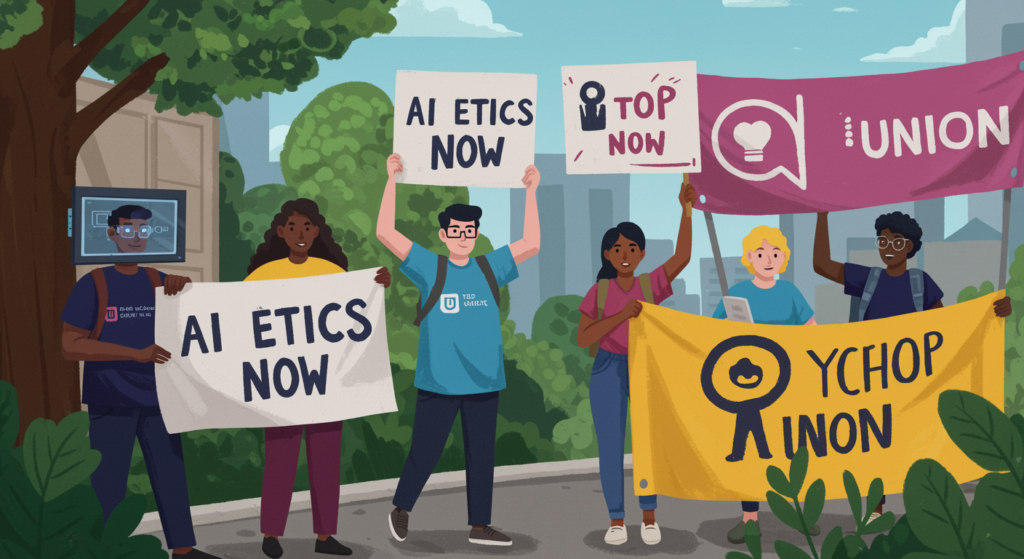
DeepMind Staff Unionize Against Defence Deals and Israel Links
Introduction
In the fast-evolving world of AI, employee voices are rising louder than ever. DeepMind unionization efforts among UK staff at Google DeepMind highlight a bold stand against the company’s defense contracts and ties to the Israeli government. This DeepMind movement isn’t just about jobs; it’s a call for ethical AI practices that prioritize human rights over profit, sparking a debate on how technology shapes global conflicts.
With around 300 London-based employees pushing for change, this initiative underscores the tension between innovation and morality. Have you ever thought about how your daily work could inadvertently fuel larger ethical dilemmas?
The Catalyst: DeepMind Unionization and Defense Deals
The spark for DeepMind unionization came from Google’s expanding role in defense, particularly a $1.2 billion cloud deal with the Israeli Ministry of Defense. Staff are deeply troubled by how AI technologies, once heralded for good, are now linked to military applications that could escalate tensions in conflict zones.
This deal, along with other partnerships, has led to widespread protests, as employees fear their contributions might enable surveillance or weaponry. It’s a reminder that in the AI ethics landscape, every contract has ripple effects—potentially harming innocent lives far from the office.
For context, reports from reliable sources like The Jerusalem Post detail how these agreements contradict earlier Google pledges against military AI use. What if your expertise was suddenly tied to decisions you morally oppose?
Why DeepMind Employees Are Unionizing
DeepMind unionization is driven by a mix of ethical objections and a desire for real influence. Employees are particularly alarmed by Google’s shift away from its former commitment not to use AI for military or surveillance purposes, a promise that once defined the company’s ethical stance.
- Ethical objections: Many staff worry about the potential for AI misuse, like in drone targeting or data monitoring, which could worsen global inequalities.
- Opposition to military uses: Picture this: a tool designed for healthcare analysis ending up in defense scenarios—it’s a scenario that’s already prompted resignations at DeepMind.
- Desire for collective bargaining: By aligning with the Communication Workers Union (CWU), employees aim to negotiate policies that ensure their work aligns with personal values, fostering a more transparent workplace.
- Resignations and protests: At least five employees have stepped down, citing these issues, which reflects a growing divide and the urgency for change in DeepMind unionization drives.
This isn’t isolated; it’s part of a broader push for accountability. If you’re in tech, you might ask yourself: How can we prevent our innovations from being weaponized?
Union efforts at DeepMind could set a precedent, offering a blueprint for others to demand ethical oversight. In fact, a TechCrunch report highlights how this movement is gaining momentum, with staff seeking to influence decisions before they escalate.
The Broader Context: Tech Industry and DeepMind Unionization Activism
DeepMind unionization isn’t happening in a vacuum; it’s part of a wave of employee activism sweeping the tech sector. Google itself has faced similar backlash, like with Project Maven in 2018, where AI was used for U.S. military drone analysis, leading to petitions and policy reversals.
- That case saw thousands of Google employees protest, ultimately influencing the company to drop the project—a win for AI ethics advocates.
- More recently, protests over cloud contracts with Israel resulted in firings, showing how quickly internal dissent can turn public.
Other giants like Amazon and Microsoft have dealt with their own ethical storms, from facial recognition tied to immigration enforcement to HoloLens tech for the U.S. Army. These examples illustrate a pattern: when tech meets geopolitics, employees are stepping up to demand better.
Imagine being part of a team that creates world-changing tools—wouldn’t you want a say in how they’re used? This activism could inspire more DeepMind-style unionization across the industry, pushing for reforms that prioritize ethics over expansion.
Implications for AI Ethics and Corporate Responsibility
The DeepMind unionization movement is a wake-up call for the entire AI field, emphasizing the need for stricter oversight on how technologies are applied. As AI grows more powerful, the risks of unintended consequences—especially in military contexts—become harder to ignore.
- Lack of oversight: Without employee input, companies might overlook how AI could exacerbate conflicts or violate human rights.
- Transparency: Staff are calling for open dialogues about research end-uses, ensuring that innovations serve the greater good rather than selective interests.
- Corporate accountability: This push challenges firms to weigh ethics against profits, potentially leading to new industry standards.
Key Examples of Employee Activism in Tech
To put this in perspective, let’s look at a table of recent cases:
| Company | Main Issue | Employee Action |
|---|---|---|
| Google DeepMind | Defense deals and Israeli ties | DeepMind unionization attempt via CWU |
| Google (Project Maven) | AI for military drone analysis | Petitions and mass resignations |
| Amazon | Facial recognition and ICE contracts | Open letters and walkouts |
| Microsoft | Defense contracts (HoloLens) | Protests and internal memos |
These instances show that DeepMind unionization could accelerate a shift toward more ethical AI practices. For anyone in the field, this is a chance to advocate for policies that prevent tech from becoming a tool of harm.
Responses from Google and DeepMind
Google has publicly emphasized its commitment to employee dialogue, with channels for raising concerns about issues like DeepMind unionization. Yet, past efforts, such as a smaller group trying to unionize, faced hurdles due to limited bargaining power.
At the time of this writing, neither Google DeepMind nor the CWU has issued detailed responses, leaving many questions unanswered. This silence might fuel more activism, as employees seek concrete changes rather than just promises.
It’s a delicate balance: companies need to listen, but workers like those in DeepMind unionization drives are demanding action. If you’re following this story, consider how your own workplace handles ethical feedback.
Potential Outcomes and Industry Impact
The success of DeepMind unionization could reshape how tech companies approach defense contracts, bringing more scrutiny to partnerships with governments like Israel’s. This might lead to revised policies that prioritize ethical reviews before deals are signed.
- Increased scrutiny: Expect more public debates on AI ethics, potentially influencing global regulations.
- Precedent for tech workers: A win here could spark similar movements, empowering employees worldwide to challenge unethical practices.
- Legal shifts: Activism like this may prompt new laws on AI applications, especially in areas involving human rights.
Think about the bigger picture: if DeepMind’s efforts succeed, it could create a ripple effect, encouraging other sectors to adopt ethical frameworks. Here’s a tip for readers—stay informed and engage in discussions to drive positive change in your industry.
Conclusion
The DeepMind unionization movement stands as a testament to the power of collective action in tech, challenging defense deals and Israeli ties while advocating for robust AI ethics. As employees push for greater oversight, this could redefine corporate responsibility and inspire a more ethical future for innovation.
If this topic resonates with you, consider sharing your thoughts in the comments below or exploring how you can support ethical AI initiatives. What steps can we all take to ensure technology serves humanity positively?
Frequently Asked Questions
- What triggered DeepMind staff to unionize? Primarily concerns over defense contracts with Israel and ethical objections to military AI applications.
- Which union are DeepMind employees seeking to join? The Communication Workers Union (CWU).
- What could this mean for AI ethics in the future? It may lead to increased employee influence, better transparency, and stricter policies on AI use.
References
- The Jerusalem Post. “Article on Google Deals.” https://www.jpost.com/breaking-news/article-851594
- Economic Times. “Google DeepMind UK Staff Challenge.” https://economictimes.com/tech/technology/google-deepmind-uk-staff-to-challenge-defence-deals-and-israel-links-ft-report/articleshow/120646646.cms
- TechCrunch. “Google’s DeepMind UK Team Seeks to Unionize.” https://techcrunch.com/2025/04/26/googles-deepmind-uk-team-reportedly-seeks-to-unionize/
- Startup Ecosystem. “Google DeepMind UK Staff Unionize.” https://www.startupecosystem.ca/news/google-deepmind-uk-staff-unionize-to-oppose-defence-and-israel-ties/
- Startup News FYI. “Google DeepMind Staff in UK to Unionise.” https://startupnews.fyi/2025/04/26/google-deepmind-staff-in-uk-to-unionise-challenge-defence-deals-and-israel-links-ft-report/
DeepMind unionization, Google defense deals, AI ethics, Israel tech protests, Communication Workers Union, ethical AI oversight, tech employee activism, military AI applications, Google DeepMind protests, corporate responsibility in tech





